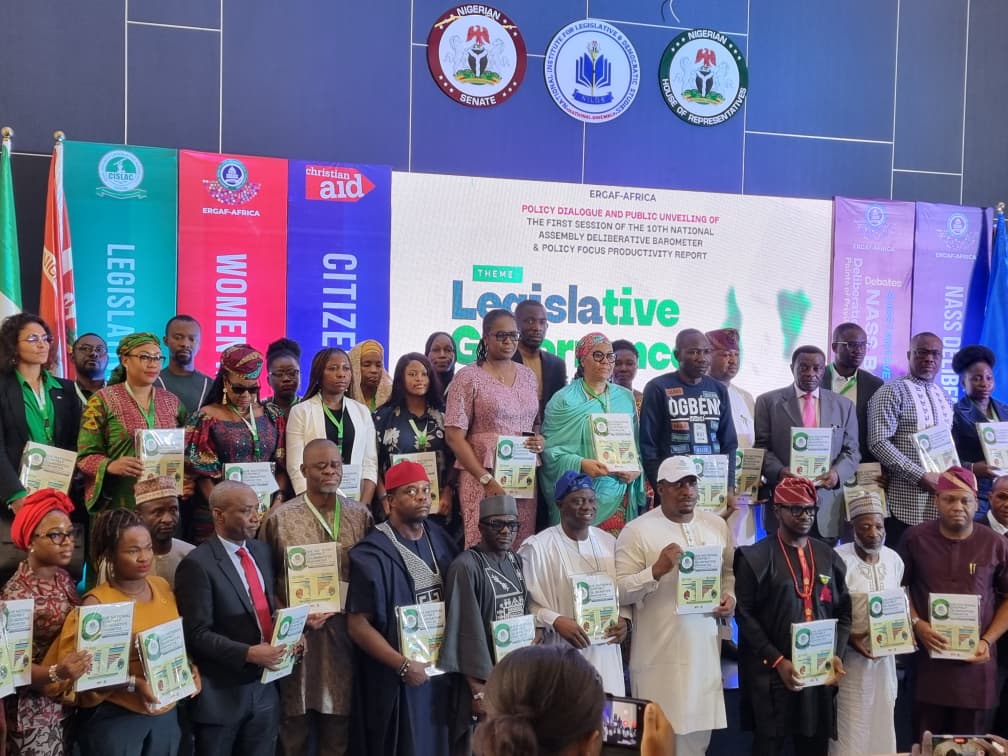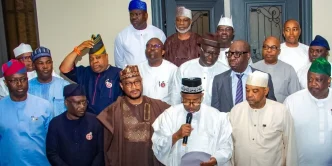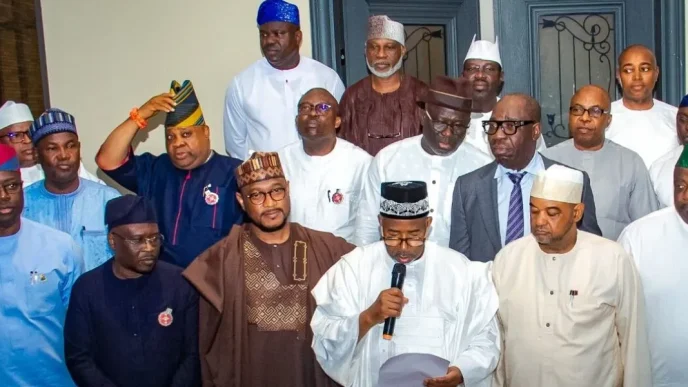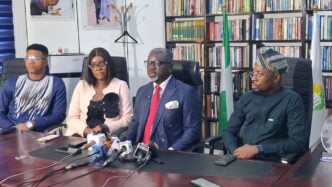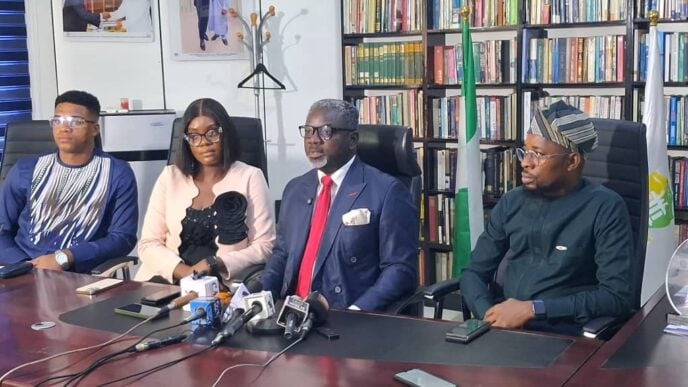ERGAF-Africa unveiling the one-year performance report
The Erudite Growth and Advancement Foundation (ERGAF-Africa) has unveiled the Legislative Deliberative Barometer and Policy-Focus Productivity Report (NASS-DBPFR).
Launched on Thursday in Abuja, the report tracks the plenary performance of lawmakers in the national assembly between June 14, 2023, and June 13, 2024 — the first year of the current 10th assembly.
Speaking at the report’s unveiling, Chibuzo Okereke, president of ERGAF-AFRICA, described the barometer as a digital accountability platform designed to provide citizens, policymakers, civil society groups, and researchers with data-driven insights into legislative debates, motions, bills, petitions, and other parliamentary activities.
Providing a breakdown of the period under review, Okereke said the senate recorded 2,275 plenary actions, with 663 (29.1%) from contributions to debate, while the house documented 4,239 actions, out of which 507 (11.9%) came from debates.
Advertisement
Bills at first reading accounted for 15.5 percent of the senate actions and 21 percent of house of representatives actions.
Sectoral analysis showed the senate focused largely on the economy (18.5%), security (13.7%), and education (10.9%), while the house concentrated on security (16.9%), economy (13.7%), and education (10.4%).
He said about five senators (4%) and 48 house members (12%) recorded no legislative action during the period under review.
Advertisement
In contributions to debate, Barau Jibrin, deputy senate president, led the green chamber with 38 interventions, while Julius Ihonvbere, leader of the house, topped the lower legislative chamber with 26.
On substantive motions, Michael Opeyemi, leader of the senate, recorded the highest number in the upper chamber with 10, as Ihonvbere led in the house with 12.
For petitions, Ngwu Osita submitted the most in the senate with three, while Okey Onuakalusi, lawmaker representing the Oshodi-Isolo federal constituency of Lagos, dominated the house with 14.
On points of order, Opeyemi and Ali Ndume, the Borno south senator, topped in the senate with six each, while Ahmed Jaha from Borno led the house with six.
Advertisement
Okereke said the digital interactive dashboard will allow Nigerians to track legislators’ contributions to drive accountability, electoral choices, and parliamentary reforms.
Supported by Christian Aid Nigeria, Civil Society Legislative Advocacy Centre (CISLAC), and other civic partners, the initiative also aims to improve legislative transparency, stimulate reforms, and promote gender-inclusive representation in parliament.
Speaking at the event, Tajudeen Abbas, speaker of the house, described the report as a “valuable tool” for tracking lawmakers’ performance.
“This compels us to constantly raise the standard of representation, lawmaking, and oversight by spotlighting legislative output. This initiative, therefore, calls for a stronger impact on the legislative process and the deepening of our democratic culture,” Abbas, who was represented by Cyril Hart, lawmaker representing Degema/Bonny federal constituency of Rivers, said.
Advertisement
“Beyond institutional reforms, this barometer aligns with the vision of the 10th house to entrench evidence-based lawmaking.
“In an age where governance must respond to data, we recognise that decisions backed by facts are stronger, more credible, and more impactful.
Advertisement
“The report and dashboard being unveiled today will serve as a reference point for legislators and stakeholders seeking to evaluate and strengthen parliamentary contributions to national development.”
Abubakar Sulaiman, director-general of the National Institute for Legislative and Democratic Studies (NILDS), who was represented by Shuaibu Danwanka, director of legal services, said the report promotes an assessment of legislative governance that is data-driven.
Advertisement
“The legislature is the most important aspect of any democracy. No nation can be said to be operating a democracy if it does not have a functional legislature,” he said.
Auwal Musa, CISLAC executive director, said the “deliberative barometer” enables Nigerians to evaluate the legislature’s performance, understand the impacts of legislative active actions, and ensure that lawmakers remain responsive to the needs and aspirations of their constituents across the country.
Advertisement
Temitope Fashola, country director of Christian Aid Nigeria, said the barometer is a “ground-breaking tool” that offers an opportunity to strengthen legislative accountability, transparency and responsiveness in Nigeria.
“By tracking and showcasing deliberation in plenary, the barometer will strengthen accountability, improve representation, and help bridge the gap between political promises and the lived realities of constituents,” Fashola said.
Fashola said the report is a pathway towards a more effective, transparent, and legitimate legislative process that will ultimately strengthen Nigeria’s democracy and accelerate national development.
